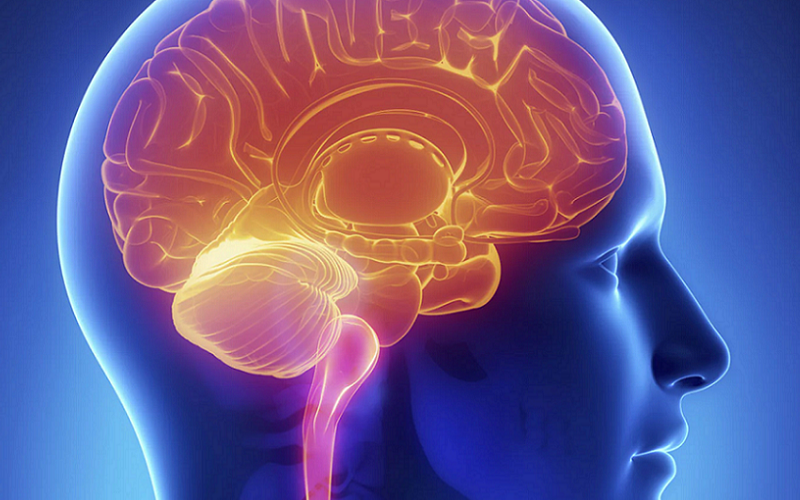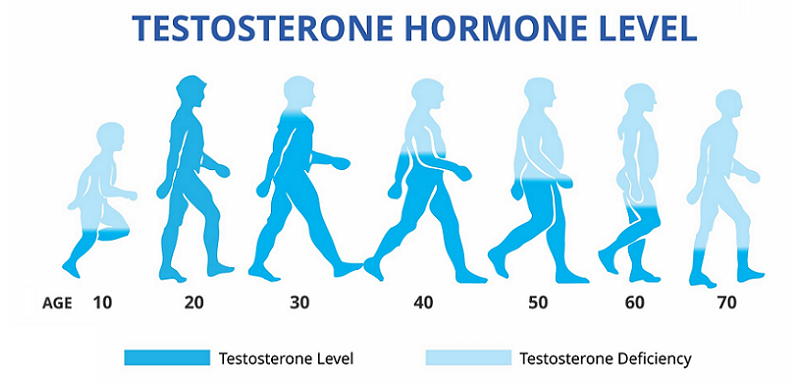
Androgens, often primarily associated with male sexual characteristics and reproductive functions, play a crucial role in the health and well-being of both men and women. However, the influence of these powerful hormones extends far beyond the realms of sexual function, reaching into the intricate workings of the human brain. Here we examine the significant, yet often overlooked, impact that these hormones have on memory, mood, neuroprotection, and even the potential to mitigate age-related cognitive decline.
Contents
Introduction Androgens
Hormones orchestrate a symphony of bodily functions, with androgens playing a lead role that impacts far beyond the confines of sexual and reproductive health. These powerful hormones, while synonymous with male traits and fertility, extend their influence into the complex workings of the brain and cognitive processes. The narrative around androgens, traditionally centered on sexual function, is evolving to embrace a more comprehensive understanding of their impact on overall health.
Definition of Androgens
Androgens, a group of hormones heralded for their role in male sexual development, encompass testosterone and dihydrotestosterone (DHT) among others. These hormones are instrumental in defining male characteristics and maintaining reproductive functions. However, their presence and roles in women, influencing libido, bone density, and muscle strength, underscore a broader physiological significance that transcends gender.
Overview of Androgens’ Role in Sexual Function
Focusing on sexual development and health, androgens are central to the narrative of male puberty, driving the development of secondary sexual characteristics and ensuring reproductive viability. Their role encompasses the deepening of the voice, growth of facial and body hair, and the maintenance of libido, muscle mass, and bone density. This focus, while critical, represents only a fraction of the physiological roles played by androgens.
The Purpose of Exploring Beyond Sexual Function
The traditional lens through which we view androgens, while informative, is limited in scope. Emerging research invites us to broaden our perspective, exploring androgens’ roles in brain health and cognitive function. This expanded view not only enriches our understanding of these hormones but also opens up new possibilities for therapeutic interventions targeting a range of conditions beyond reproductive health issues [1].
Brief Mention of Androgens’ Impact on Brain and Cognitive Health
Recent studies have illuminated the significant impact of androgens on the brain, revealing their influence on memory, mood, and neuroprotection. This growing body of evidence challenges preconceived notions about hormonal function and emphasizes the need for a holistic approach to understanding the multifaceted roles of androgens in health and disease.
Understanding Androgens
Before delving into the complex relationship between androgens and brain health, it’s crucial to build a foundational understanding of these hormones. Androgens play a pivotal role in the development and maintenance of male characteristics, but their influence permeates various bodily functions, affecting both men and women.
Types of Androgens
Androgens encompass a variety of hormones, each with unique roles yet collectively contributing to the androgenic effects in the body. The most well-known androgen is testosterone, renowned for its significant role in male sexual development and health.
Another key player is dihydrotestosterone (DHT), a more potent derivative of testosterone, crucial for the development of male secondary sexual characteristics. Additionally, androstenedione, a precursor to both testosterone and estrogen, plays a role in hormone synthesis and balance. Understanding these types, among others, is fundamental to appreciating the diverse functions and effects of androgens.
How Androgens Are Produced and Regulated
The production and regulation of androgens are finely tuned processes involving multiple organs, primarily the adrenal glands and the gonads (testes in men and ovaries in women). The hypothalamus and pituitary gland play critical roles in regulating androgen production through a series of hormonal signals [2].
The hypothalamus releases gonadotropin-releasing hormone (GnRH), which in turn stimulates the pituitary gland to release luteinizing hormone (LH) and follicle-stimulating hormone (FSH). LH is particularly important for stimulating the production of androgens in the gonads. This regulatory mechanism ensures that androgen levels within the body are maintained within a healthy range, reflecting the body’s remarkable capacity to balance hormone levels.
General Functions of Androgens in the Body
Beyond their well-documented role in sexual development and reproductive health, androgens influence a broad spectrum of bodily functions. They contribute to the development and maintenance of muscle mass and strength, play a crucial role in bone density, and influence fat distribution.
Androgens also impact skin and hair health, with effects on sebum production and hair growth patterns. Furthermore, these hormones are involved in regulating mood and energy levels, illustrating their wide-reaching impact on both physical and psychological well-being.

Androgens and the Brain: An Overview
The brain, a complex and dynamic organ, is significantly influenced by the hormonal environment of the body, including androgens.
Influence on Brain Structure and Development
Androgens have a profound impact on the brain from early development through adulthood. During fetal development, they play a critical role in sexual differentiation of the brain, influencing the formation of gender-specific patterns and structures.
Research has shown that androgens affect the size and connectivity of certain brain regions, including areas responsible for emotional regulation, decision-making, and memory. For example, testosterone is known to influence the volume of the hippocampus, a region critical for memory and spatial navigation. These structural changes underpin the functional differences and cognitive abilities observed between genders and across individuals.
Effects on Cognitive Functions
The role of androgens in cognitive function is a fascinating area of study, with evidence suggesting that these hormones can enhance certain cognitive abilities. Studies have linked optimal testosterone levels to improved spatial abilities, memory recall, and faster processing speeds. The mechanisms behind these effects are complex, involving androgens’ interaction with neurotransmitter systems and their influence on synaptic plasticity, which is crucial for learning and memory.
It’s important to note that the relationship between androgens and cognitive function is not linear, with both low and high levels of hormones potentially leading to cognitive deficits, highlighting the importance of hormonal balance for optimal brain function [3].
Androgens’ Role in Mood and Emotional Well-being
Androgens also play a significant role in regulating mood and emotional well-being. Testosterone, in particular, has been associated with feelings of confidence, motivation, and overall mood elevation. Conversely, low levels of androgens are often found in individuals suffering from depression, anxiety, and mood disorders. The exact mechanisms through which androgens influence mood are still being unraveled but are thought to involve the modulation of neurotransmitter systems, such as serotonin and dopamine, which are key regulators of mood and emotional states.
Neuroprotective Effects of Androgens
Emerging research suggests that androgens may possess neuroprotective properties, offering defense against neurodegenerative diseases and brain injury. Testosterone and other androgens have been shown to reduce inflammation, protect neural tissue from damage, and promote the survival of neuronal cells.
These effects could have significant implications for the prevention and treatment of conditions such as Alzheimer’s disease, Parkinson’s disease, and traumatic brain injuries. Understanding the neuroprotective mechanisms of androgens opens new avenues for therapeutic strategies aimed at preserving cognitive function and brain health.

Cognitive Functions Influenced by Androgens
Androgens, particularly testosterone, have profound effects on various cognitive functions. Beyond their primary roles in reproductive and physical health, these hormones significantly influence brain function, affecting memory, mood, emotional well-being, and even neuroprotection and neurogenesis.
Memory and Learning
Impact on Spatial Memory
Androgens have a notable impact on spatial memory, which is crucial for navigating environments and understanding the spatial relationship between objects. Testosterone, for instance, enhances spatial memory by acting on androgen receptors in brain areas such as the hippocampus, which is essential for forming and retrieving spatial information. This enhancement is thought to improve one’s ability to perform tasks that require navigation or spatial orientation.
Effects on Working Memory and Cognitive Flexibility
Testosterone also influences working memory and cognitive flexibility, the abilities to hold information temporarily and to switch between tasks or thoughts effectively. Higher levels of androgens are associated with improved working memory and increased cognitive flexibility, facilitating better performance in multitasking and problem-solving tasks. These effects underscore the critical role of androgens in supporting cognitive processes that are essential for daily functioning and decision-making [4].
Mood and Emotional Well-being
Androgens and Depression
The relationship between androgens and mood disorders, such as depression, highlights the hormones’ significant impact on emotional well-being. Low levels of testosterone have been linked to increased symptoms of depression in men, suggesting that androgens play a protective role against the development of mood disorders. Hormone replacement therapies that include androgens have shown promise in alleviating depressive symptoms, pointing to the potential therapeutic benefits of maintaining balanced androgen levels for emotional health.
Androgens and Anxiety
Similarly, androgens have been implicated in the regulation of anxiety. Studies indicate that balanced testosterone levels can contribute to reduced anxiety, potentially through the modulation of neurotransmitter systems involved in anxiety regulation. However, the relationship between androgens and anxiety is complex, with varying effects depending on individual differences and the specific context of hormone action.
Neuroprotection and Neurogenesis
Role in Protecting Against Neurodegenerative Diseases
Androgens exhibit protective properties against neurodegenerative diseases, such as Alzheimer’s disease and Parkinson’s disease. By interacting with neural pathways and reducing inflammation, androgens can slow the progression of neurodegeneration, offering a potential avenue for therapeutic intervention. This protective role underscores the importance of androgens in maintaining cognitive health and preventing cognitive decline.
Influence on Brain Plasticity and Repair
Moreover, androgens influence brain plasticity and the capacity for repair, promoting the growth of new neurons and supporting the brain’s ability to adapt to new information or recover from injury. Testosterone, in particular, has been shown to enhance neurogenesis, contributing to improved cognitive function and resilience against brain aging and injury. This effect highlights the potential of androgens to support brain health across the lifespan, reinforcing their significance beyond their traditional roles.
Androgens and Age-Related Cognitive Decline
As individuals age, cognitive decline becomes a growing concern, with factors such as hormonal changes playing a significant role in this process. Androgens, particularly testosterone, have been the focus of research to understand their relationship with cognitive function in older adults.
Androgens in Aging Men and Women
The natural aging process is associated with a gradual decline in androgen levels in both men and women, a condition known as andropause in men and menopause in women. This decline can lead to various health issues, including a decrease in cognitive abilities. Studies have shown a correlation between lower testosterone levels and the onset of cognitive impairments in older adults [5].
In women, the post-menopausal period, characterized by significant hormonal changes, including a decrease in androgen levels, has also been linked to reduced cognitive performance. Understanding these patterns is crucial for developing strategies to maintain cognitive health in aging populations.
Correlation Between Androgen Levels and Cognitive Performance in Older Adults
Research indicates a significant correlation between androgen levels and cognitive performance in older adults. Higher levels of androgens have been associated with better cognitive function, particularly in areas such as memory, executive function, and spatial ability. Conversely, lower levels of testosterone and other androgens are often found in individuals with cognitive impairments, including dementia and Alzheimer’s disease. These findings suggest that maintaining optimal androgen levels could play a role in preventing or delaying cognitive decline in the elderly.
Potential Therapeutic Uses of Androgens for Cognitive Decline
Given the correlation between androgens and cognitive function, there is growing interest in the potential therapeutic uses of androgens to combat age-related cognitive decline. Hormone replacement therapy (HRT) with testosterone or other androgens has been explored as a means to improve cognitive function in older adults.
While some studies have shown promising results, indicating improvements in memory, executive function, and overall cognitive performance, the evidence remains mixed. The risks and benefits of androgen therapy need to be carefully weighed, and more research is required to establish effective and safe treatment protocols.
Challenges and Considerations in Androgen Therapy
The use of androgen therapy to address cognitive decline presents several challenges and considerations. Determining the optimal dosage, timing, and duration of treatment to maximize benefits while minimizing adverse effects is complex. There is also a need to identify individuals who are most likely to benefit from such therapy, taking into account factors such as baseline hormone levels, genetic predispositions, and existing health conditions. Moreover, the long-term effects of androgen therapy on cognitive health and overall well-being are not fully understood, highlighting the importance of ongoing research in this field.
References
[1] Androgens and Cognitive Impairment in Older Men
[2] Androgens increase excitatory neurogenic potential in human brain
[3] Androgen Effects on Neural Plasticity
[4] Androgens’ effects on cerebrovascular function in health and disease
[5] Androgen Therapy in Neurodegenerative Diseases

